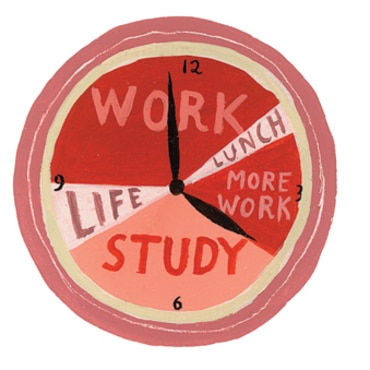How do I adjust my life to an unpredictable clinical schedule?
Summary:
You have to find time to do things that you love. Life is not balanced or healthy if you’re working and studying 24/7. No two med students will have the exact same experience on a rotation. How you THINK about your clinical rotation is how you will perceive it. What is your inner dialogue telling you? Are you approaching the rotation in a way that will help your learning and maybe even make it more fun and enjoyable for yourself at the same time? Practice gratitude in all of your challenging situations. Make sure you’re flexible with your inner dialogue as well as your schedule. Give yourself a time buffer just in case things in your rotation take longer than expected. Always remember to connect with your fellow medical students because they’re going through the same sort of experience you are, and it is truly unique to medical school. Never be afraid to reach out to others.

“You still have to be you”
An important thing to keep in mind during your rotations is that no matter what rotation you’re on, you should always make time for things that you enjoy. Don’t put your life entirely on hold. Take time for yourself when you can, whether that means exercise or just resting your mind, reading a book, etc.
Before rotations start, write down a list of activities or hobbies, and try to participate in one at least once a week, even if it’s just a short amount of time. This is a prime opportunity to develop wellness skills, particularly for your future training in residency and later on in professional practice. No matter how busy things get, you cannot deny the things which “make you, you” indefinitely. Finally, take advantage of days you have off to see your friends and/or family, relax a bit, and don’t stress about making every off-day a 12-hour study day. Make sure you’re being realistic in your expectations and that your inner dialogue is reflecting a positive inner narrative.
“Managing your inner dialogue”
reality, these experiences are different for everyone. No two people will have the exact same rotation experience. Surgery rotations might be inspiring and energizing for some, yet exhausting for others, while psychiatry can be painfully boring and invigorating for different medical students in the same way. How you THINK about clinical rotations is how your perceptions will be colored… Examine your inner dialogue. What narrative are you telling yourself? How might you change that narrative in a way which helps your learning and enjoyment of the situation?

One powerful practice is that of gratitude. Did you deal with a difficult situation today? How did that challenge help you learn? How might you be grateful for that challenging experience? When you are in a state of gratitude, you experience life in a positive and inspiring way. For those who might be prone to negative ruminations, try to be a little more flexible in what you expect from a certain situation, and practice directing your thoughts toward gratitude. Consider keeping a journal, and each evening write down: one thing you are grateful for, one thing you can do better, and one thing that you’ve learned.
“Be flexible”
While some rotations may be a bit more predictable than others, you still have to allow them to dictate your schedule to a large extent. In certain rotations this is an inevitability, but with others that are less time-consuming, it may still be presumptuous to make plans without creating a bit of a time “buffer,” that is, an hour or two cushion in case things don’t go as predicted while you are rotating (a case takes a long time, a patient shows up late, etc.). For example, don’t schedule things tightly while rotating in outpatient clinics because you will be faced with unpredictability on when the day concludes. It’s important to be flexible, but it’s also important to take the time to connect with family, friends, and other medical students. These people will help keep you centered during this unique experience.
“Connect with other medical students”

Resources:
Previous Pain Point: How do I properly study for the shelf exam during rotations?
Next Pain Point (Moving to Phase 4): How do I make a choice about specialty?